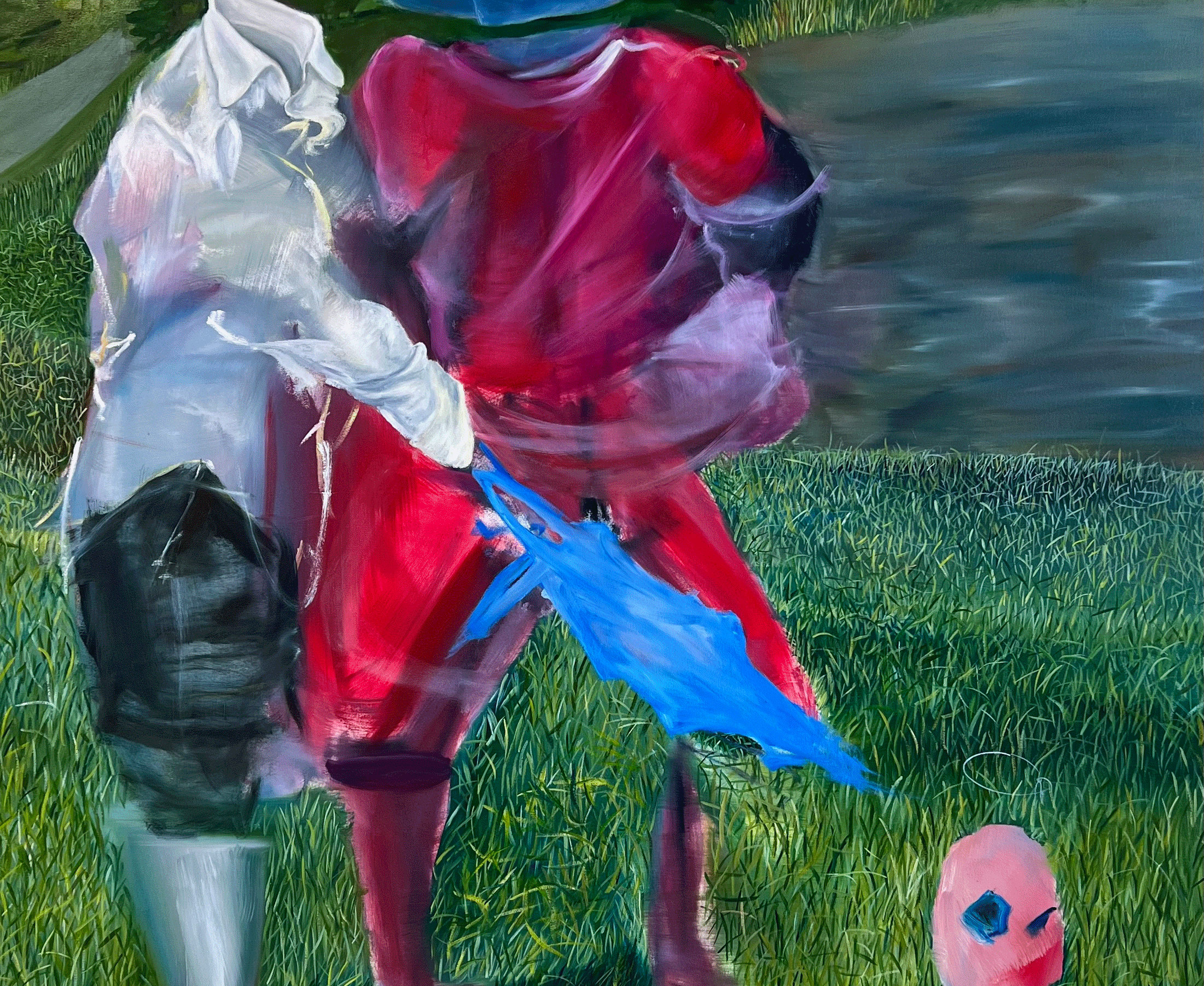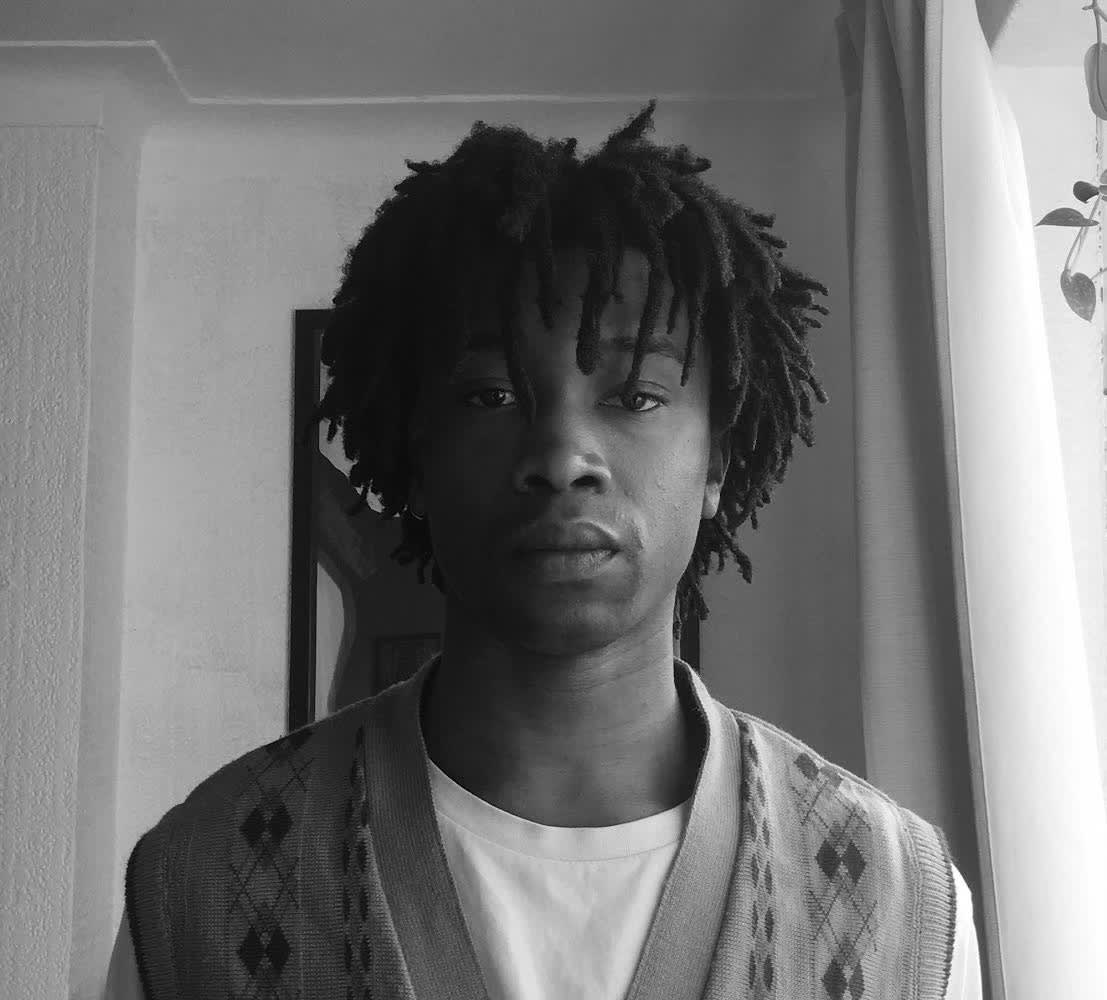MO: How would you describe your relationship with your recent work, Everything Lives, Everything Moves, Everything Corresponds(2022)?
JA: It’s a more consolidated approach to my thinking process and where all my ideas come from. I tried to synthesise all the things that interest me. It deals with time, history and our connection to our immediate environment.
It's kind of like, how do I capture the sensation of reality? And for me, reality is not just this [Jamiu taps the chair]. It's the way we interact with the digital space, our relationship with images and how that affects the way we see the world. I was interested in trying to build a bridge between all those ways of seeing and being.

Details Everything Lives, Everything Moves, Everything Corresponds,(2022)
MO: What prompted you to begin thinking about interconnectedness in terms of your practice?
JA: Life, I guess. I don't know, it's just what life is at the minute. Every time I try to work from a conceptual standpoint, whenever I do that, the painting never works. I let things in my day-to-day life, like conversations or images, coalesce. For instance, I'll just be having a conversation with a friend, I’ll see somebody with a pink thing in a field that catches my eye and I’d think about how that relates to everything else I'm going to paint. It’s a mixture of me letting things happen by chance, not forcing too much and trying to be as receptive as possible in my day-to-day life for that to happen. I think my work's about engaging with myself, predominantly. It's me just feeling my way through the world in some sense.
There is a strong theme - I don't know if you've heard of Jackie Wang when she talks about Oceanic Feeling? Fred Moten talks about the same thing. To reside without setting. Everything, regardless of what you engage with, regardless of how frivolous it is or how serious it is, just take it as seriously as possible. I'm always picking things apart from that point.
MO: Could you expand on what you mean by the idea of residing without setting?
JA: To reside without setting is to commit yourself to something completely regardless of what it is. It's to commit yourself to something but equally be prepared to leave it alone once the moment has passed.
When you engage with something, you’re not working through nostalgia or memory - you just engage with that thing, with that moment, because you’ve both come to a meeting point.
But as soon as that thing stops, it ends, so you move on to the next thing. Whatever happened yesterday, don't carry it with you towards tomorrow.
That's what I try to capture in my work. Even in the way the works are conceived - I want to have this rhythm like the works are conceived in one sitting. Obviously, it isn’t, but I want that rhythm within the work, in a sense.

JA: There's tremendous energy in everyday objects and scenes. If you look deep enough, there's magic to them. There's more magic in them than in dreams.
If you really look at something, it's like the universe oscillates within it. No matter if it's a tree, person or a classic object, there is a timeline in history that links to why that thing exists. Everything has its own pace of moving. That really interests me, how everything is connected.
It doesn't matter at what pace, but the intention behind the engagement with that subject. I choose to subvert [everyday objects] as it is a way of revisiting that thing again. We get quite mechanical in our day-to-day existence; subversion allows me to revisit that figure in a new light, to see it for what it actually is.

MO: Do you differentiate between personal and collective memories?
JA: I think they are intertwined in a way - there isn't much differentiation, which is kind of dangerous to say to some extent. I say there’s no differentiation because I know that the things I've experienced in the past affect things that I am about to experience.
Of course, memory changes over time; you remember bits and aspects of things. I don't think I really differentiate between the two. I think that's why I long to paint the things I do, just to combine those things. I used to dream extremely vividly when I was younger to the point that sometimes I would wake up and it would take me five minutes to feel like I actually was in the real world.
In a way, we learn from all aspects of reality. I think it's about not ignoring what happens in the dreaming or sleeping world, not trying to combine them in life but taking each of them seriously. It's about taking the dream as seriously as waking life.
I used to try to find too much meaning between the crossover. Now I just treat them as they are, as different operational systems. They’re like two sides of a coin which work alongside each other; they have to coexist and that barrier has to be there. I like to oscillate between the two without feeling like I have to make meaning out of all of it.

MO: In the past, when asked about your work, you mentioned Dionysian surrealism. How does this concept relate to your current practice?
JA: There’s a Dionysian aspect to my work, it’s quite eerie and dark but I find the darkness quite funny. I don’t know. People take eerie stuff a bit too seriously. But when you put humour to it, it breaks that seriousness and you're able to deal with your own monsters.
The work I was making when I made Marshes (2022), had a sort of twisted, super subverted reality in terms of the subject matter. I was looking at objects that we have in day-to-day life like water pistols. They’re pretty, they’re quite dark objects but at the same time, they’re quite playful. This represents a whole spectrum of feelings, this is unpacking that sort of thing. The whole darkness thing is present in the way that they’re packaged to children through popular culture; they’re still dark objects, but they have a playful edge to them.
I just like that nature of life; there’s that dark energy which most people neglect but we have to embrace it, in order to understand it properly.
The more we understand those parts of ourselves, the more we’re able to move through life without feeling this guilt. You're able to manage what gives rise to the darkness, instead of boxing them up.
MO: Were there any catalysts that inspired you to view the intersections between your practice and the nature of reality in this way?
JA: Growing up, I had a lot of sleep paralysis, you know, dealing with this thing I saw every night, waking up not able to breathe. I had to deal with my own personal fears.
I read a lot of Simone Veil and Carl Jung. Jung talks about sleep paralysis; he says your monsters are not outside of you, they are things which haven’t been dealt with correctly. You’re looking at things like that’s not me, when in actual fact, it is. After reading that and other books of that nature such as the Tibetan Book of the Dead, it made me understand that the thing I was seeing was me. As soon as I understood that, I stopped having sleep paralysis straight away.
That changed my whole view of dealing with my own fears about things. It’s quite liberating. It's like not being ashamed of being hungover or being drunk; if you're going to do it, just do it, but don't carry it with you to the next day.
That gave me a little freedom to not care because, ironically, I went through phases like - I need to be clean - the whole added pressure of being centred. But that's not really being centred; you’re suppressing the things you want to feel, you think there's only one way of being in order to accomplish something.

MO: What are your plans for the future?
JA: Keep painting. I mean, given the opportunity, being able to paint as much as I can really, and to live the life that I want will. That’s pretty much it, to be honest.
Moriah Ogunbiyi is a writer and photographer based in London that is concerned with documentation. He believes conversations and dialogues often reveal inspiring, thought-provoking, and entertaining narratives.

